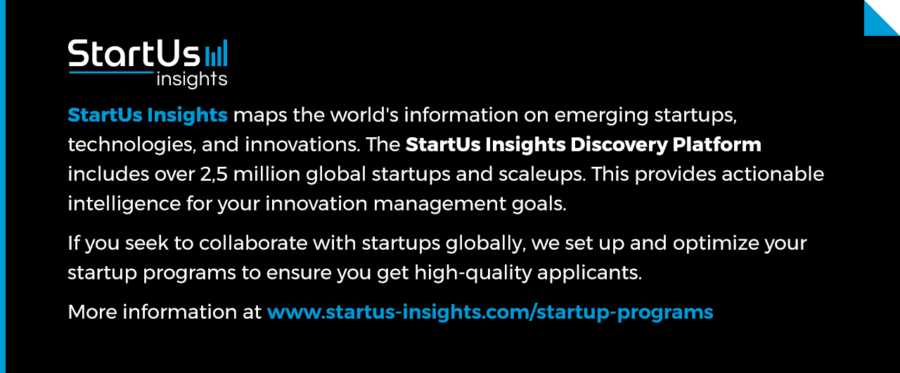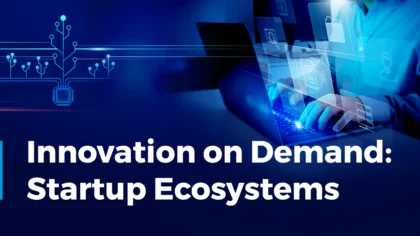In today’s innovation environment, companies always need to be alert to new technologies and emerging trends that shape their industries. Such disruptions are often led by startups since, unlike bureaucratic corporations, they move fast. Working with these startups allows companies to tap into their creativity and agility to advance their own innovation goals. Today, we learn about one effective way you can do this: virtual startup programs.
Data-driven virtual startup programs allow companies to find startup partners that address one or more critical aspects of their innovation challenges. For instance, with firmographic data on over 2,5 million startups, the StartUs Insights Discovery Platform identifies the most relevant startups for your virtual startup programs. For startups, access to a large company’s infrastructure and experience is a great asset as they build their solutions.
However, in an increasingly remote-first world, many startups aren’t keen to move their teams to a corporate location, especially if in a different city or country. Many founders feel that money spent on relocation and other logistical aspects is better spent on growing their startups. This is where virtual startup challenges. By combining the benefits of startup challenges with the flexibility of remote work, they enable successful startup-corporate collaborations.
Why Host Virtual Startup Programs
If you are an innovation manager setting up your next startup program, here are 4 reasons why you should consider taking it virtual.
1. Identify Key Trends Earlier
Over time, innovation cultures in a region converge as companies learn from each other. This is why all American fast food tastes similar and why all German carmakers care so much about engineering. However, this may have a negative impact if you collaborate with only companies and startups near you. Your company will have a myopic vision of emerging technology and business trends elsewhere around the world.
Data-driven virtual startup challenges address this by enabling you to identify key trends globally. A last-mile delivery startup in Hong Kong will have a different approach compared to one in the US. Both the technologies they develop and the business models they adopt will be different based on what is available in their environment. As a logistics company in Europe, for example, you can learn from and adapt both for your needs. A data-driven virtual startup challenge brings a large number of trends, however niche or futuristic, to your attention.
2. Cast a Wider Net
Innovation is more geographically distributed than ever before. Founders and engineers in places like Tallinn, Bali, or Rio de Janeiro are building solutions that compete with any other company. However, gone are the days when these innovators necessarily want abroad to grow their company. With the right ecosystem where they are, they are tackling global challenges while building locally. If your startup challenge is hosted in person, you will miss out on these startups.
On the other hand, a virtual startup challenge is equally attractive to a startup based near you as it is to one thousand of miles away. This grows the number of applications your startup challenge receives, providing you with a richer pool of applicants to pick from. While the increased number itself increases the likelihood that you receive high-quality prospects, the diversity of applicants — and that of their approach to problem-solving – is also enriching.

Virtual startup programs allow you to engage with more startups as compared to onsite startup programs.
3. Allocate Resources Better
For startups, virtual startup challenges enable access to industry giants without the costs of moving to be near them. For startups from countries with lower purchase power, the exchange rate alone will eat up a chunk of their budget if they were to move. When participating in virtual startup challenges instead of onsite programs, they can utilize the extra cash to grow their team or invest in research and development. The impact on the corporation hosting the challenge is similar but on a bigger scale.
If moving in successful applicants is a big portion of your startup challenge budget, making it virtual is worth it. While some argue in-person collaborations are better for learning, the COVID pandemic has shown that learning can be done effectively online. You can spend the extra cash on engaging with more applicants at each stage of the startup program, working with a larger pool of successful applicants, and providing them a longer runway. For programs where some physical collaboration is necessary, semi-virtual startup programs combine the best of both worlds.
4. Speed up Pilot Programs
When companies host startups for startup challenges, they are taking multiple small bets at once. Helping identify the winners early is critical to improving the return on investment of the whole exercise. To do this, they run pilot programs with each startup in their program. Depending on the goals of the startup program, this could be about building a functioning prototype, achieving energy efficiency beyond a threshold, or best fit with the organization’s technology stack and innovation culture.
When all startups are on a campus where an onsite startup program is being run, reliably assessing all of the pilots at once can be a challenge. For one, startups may mimic each other and end up making similar degrees of progress over the months. Also, the host company’s innovation teams may have to spend a lot of time communicating with the founders and their teams. By incorporating asynchronous communication and geographically distributing the pilot programs, virtual and semi-startup challenges speed up pilot programs.
Setting up a Virtual Startup Challenge?
The competition for startup-corporate collaborations is a two-way street. It is not just companies that are assessing startups. Startup founders consider more than brand name alone to decide on corporations to work with. A successful virtual startup challenge that relies on how well it matches startups and startup challenges? To do just that for your startup challenge, we offer the following deliverables:
- Conversion-optimized Landing Page: Leveraging our experience with SEO-optimized content, we set up the landing page of your startup program to attract more applicants.
- Direct Outreach: By using our propriety Discovery Platform covering over 2,5 million startups globally, we find the ones that fit your innovation needs and convert the most relevant ones into applications for your program.
- Promotional Outreach: By promoting your program through our magazine, social media channels, and 2 500+ online communities, we present it to promising startups globally. This also builds long-term awareness in the relevant startup community
- Applicant Pre-screening: When, with our combined efforts, you receive more applicants than you can handle, our trained Analysts analyze startup data to pre-screen the startups with the best potential.
Looking to set up a semi-virtual startup program? Or have one running but struggling with conversion? Get in touch to know how our data-driven approach attracts highly relevant and promising startups to your startup program.






![15 Top Market Intelligence Software Tools [2024] | StartUs Insights](https://www.startus-insights.com/wp-content/uploads/2024/03/Market-Intelligence-Software-SharedImg-StartUs-Insights-noresize-420x236.webp)
